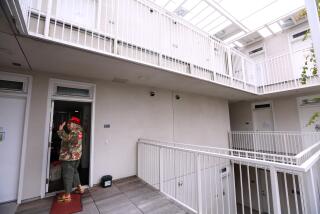Editorial: Another homelessness plan emerges. Yay. Now let’s see some follow-through.
The simplest solution to chronic homelessness is also the most daunting: Build more housing or retrofit existing units. Then, for the most troubled or disabled homeless individuals, supply services to help them become more self-sufficient: mental health care, substance abuse treatment, job counseling. The welter of plans expected out of L.A. city and county governments in the coming days will include the goal of building permanent supportive housing at a cost of tens of millions of dollars. So a proposal by state lawmakers to issue $2 billion in bonds for housing California’s chronically homeless people with mental illness, paid for with funds reserved for mental health programs, offers a welcome infusion of money to the expensive and challenging business of building such housing.
The projects funded will have to employ the ‘housing first’ model ... that calls for placing homeless people into housing before addressing their dependencies and disabilities.
Senate President Pro Tem Kevin de Leon and a bipartisan group of his colleagues announced the proposal Monday on skid row in the courtyard of Star Apartments, one of the most successful examples of permanent supportive housing in the city. And these legislators — in contrast to the L.A. elected officials who have pledged $100 million to fight homelessness — actually knew where the money would come from. The annual bond payments would be covered by $130 million of the approximately $1.8 million in funds generated each year for mental health services by Proposition 63. That ballot measure was co-authored by former Senate leader Darrell Steinberg, who was an early advocate for using some of its funds to build housing. Steinberg is a champion of the new proposal.
------------
FOR THE RECORD
In a January 6 editorial on a state Senate proposal to issue bonds for housing homeless people, the amount of annual revenue generated by Proposition 63 was reported as $1.8 million. It is $1.8 billion.
------------
The projects funded will have to employ the “housing first” model, a proven approach that calls for placing homeless people into housing before addressing their dependencies and disabilities. De Leon estimates the funds could help produce at least 10,000 units of housing; Steinberg says it could be several times that.
Beyond that, however, the proposal is short on details and ripe for political problems. The money will be distributed to county governments through a competitive grant process, but what the criteria are, how long it will take to get funds, and how much any one project could be awarded all remain to be decided. Currently, counties get a share of Proposition 63 funds based on their population. That won’t happen with these housing project funds, although de Leon said he expects that a “good portion” of the funds will go to Los Angeles County. As well it should: The county has about 44,000 of the state’s 114,000 homeless residents, making it, in de Leon’s words, the “epicenter” of homelessness.
It makes sense that the state legislators want to contribute funding to projects, not wholly underwrite them. The point is to use the state money to help generate more funding from other contributors, including the federal government and private investors. Permanent supportive housing projects are financed with the help of numerous funding sources, which can take years to piece together. The state’s dollars could very well make that process go faster. And it’s smart to make the process competitive, rather than creating what amounts to a new entitlement for local governments. The idea is that proposed projects wouldn’t even get funded until local government officials and project developers could show they were coordinating their efforts into a solid proposal.
Like many Angelenos, de Leon is frustrated with the lack of coordination and vision on the local level in Los Angeles when it comes to housing homeless people. Simply distributing more money to the county for officials to do as they please doesn’t fit his particular vision for solving homelessness.
His skepticism is understandable. But here is what we are skeptical about: We have seen a succession of powerful people — city councils and mayors, county supervisors — step up to a podium and say that Los Angeles’ approach to housing homeless people has failed, so they’re intervening with a plan that supposedly will work better. (At least de Leon is smart enough to say that his plan won’t completely solve the homelessness problem.) And though we are encouraged to see more people devote time and attention to this issue — and in the case of the senators’ plan, put a serious amount of new money onto the table —we’ve yet to see a credible effort to bring the various players together to coordinate their efforts. We are weary of the well-meaning if not fully thought-out, ad hoc efforts. Now that they’ve stepped up to help, the lawmakers need to follow through with a fair way for distributing the funds. And city and county officials in Los Angeles need to come up with credible, inventive proposals for getting the county’s much-needed share.
Follow the Opinion section on Twitter @latimesopinion and Facebook
More to Read
A cure for the common opinion
Get thought-provoking perspectives with our weekly newsletter.
You may occasionally receive promotional content from the Los Angeles Times.










